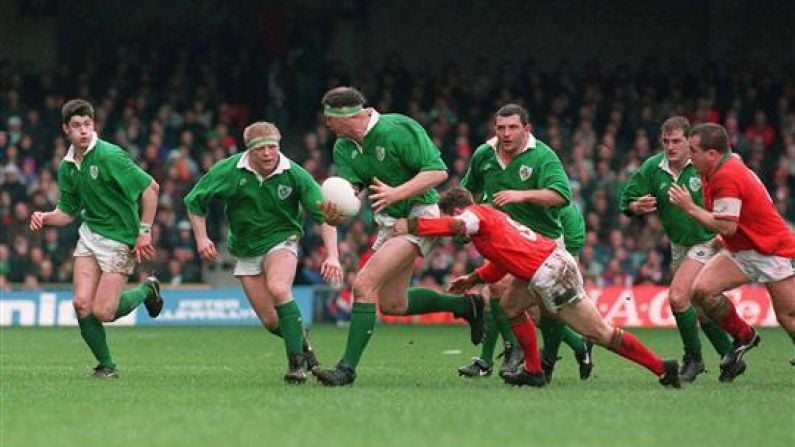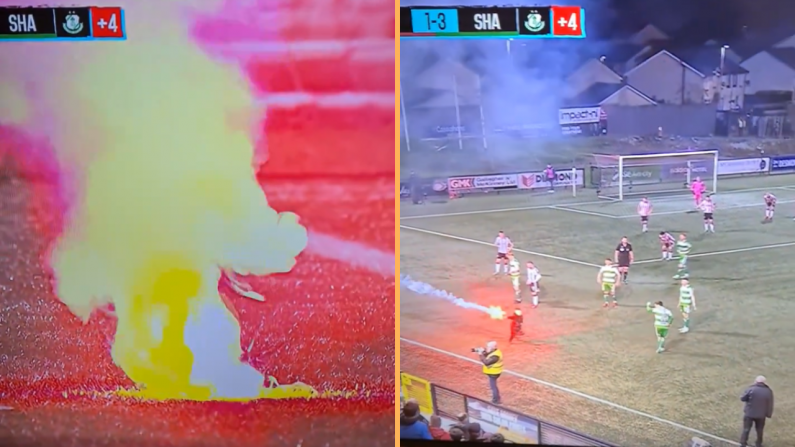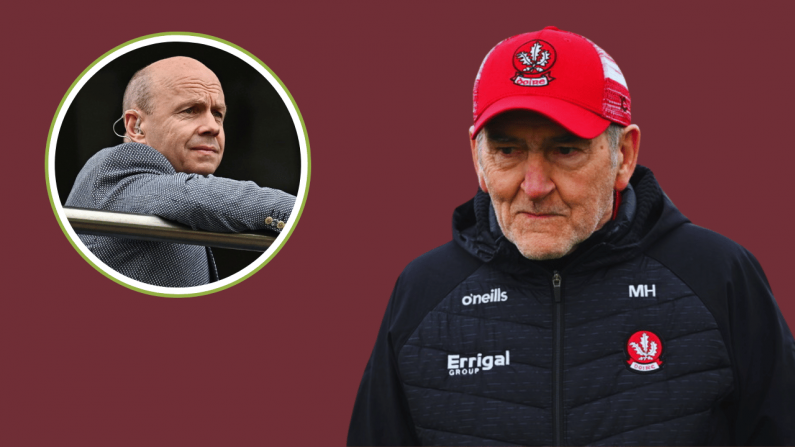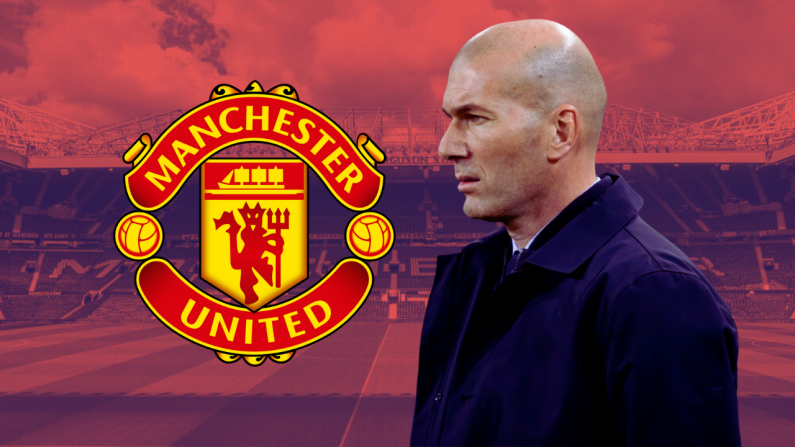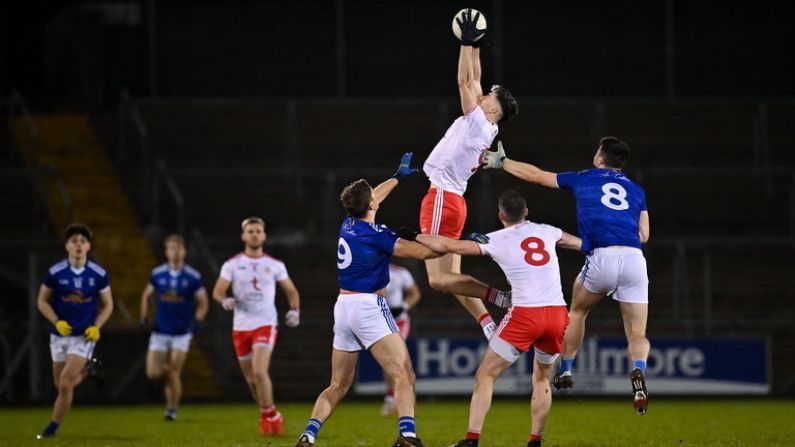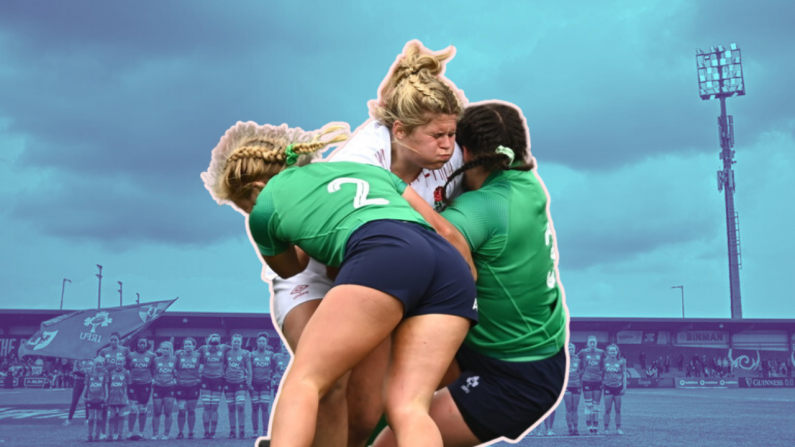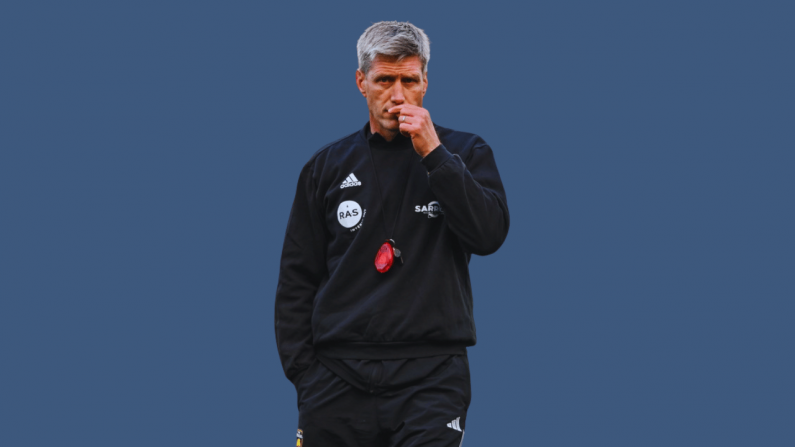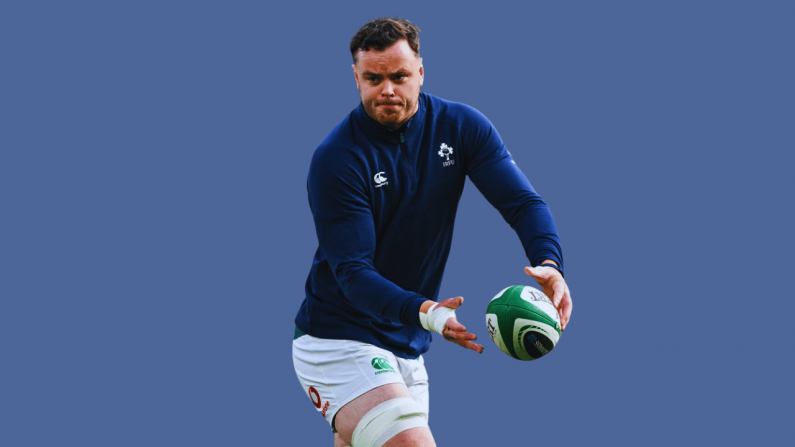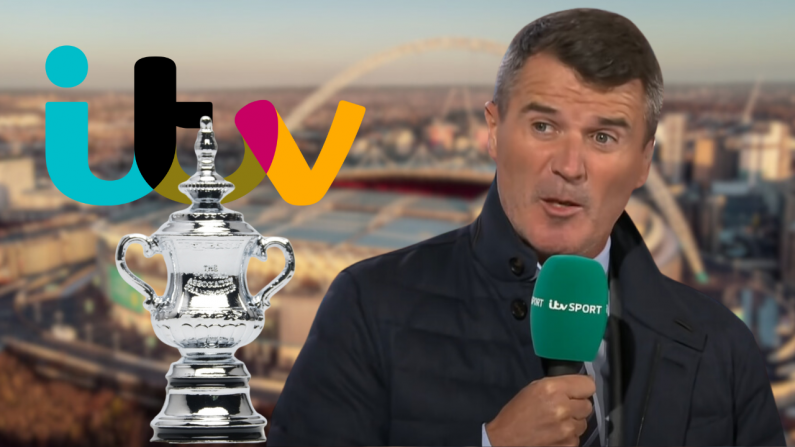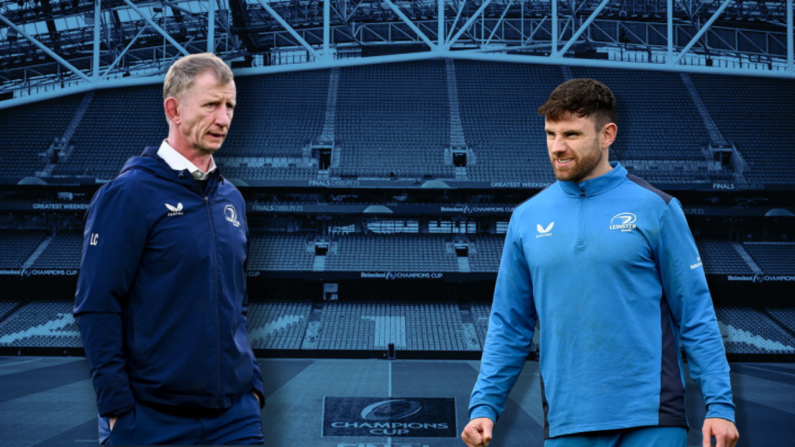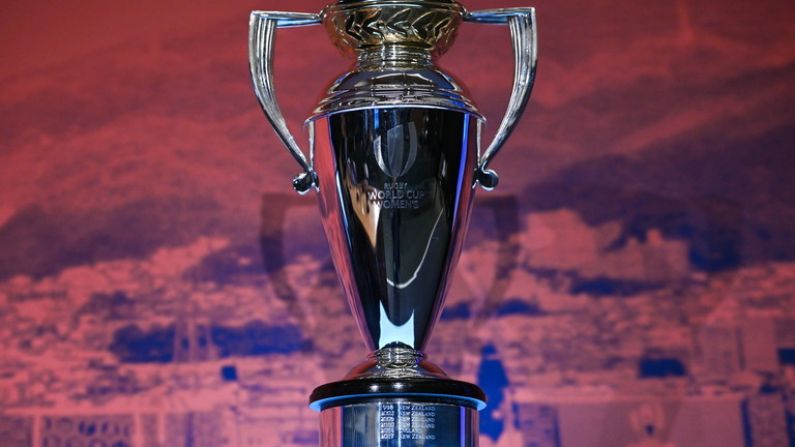Davy Tweed had a large tattoo on his arse and a Union Jack flying outside his house when he got the call from Noel Murphy.
He wasn't destined to have a long international career.
At 35, he remains the oldest debutant in the history of Irish rugby. He is also probably the most controversial player ever to pull on the jersey.
Blackrock winger Niall Woods was playing in his first Five Nations that year and played alongside Tweedy that day.
He was just massive, that would be the first thing that would spring to mind. But yeah, he was a nice enough bloke. I remember he had the old UVF tattoo on his arse. Thankfully I can't picture it.
Tweed's selection was a big surprise. He had been playing for Ulster for a good number of years at that point but it was widely thought there were more talented second rowers in the queue ahead of him. He had even been contemplating stepping down to the genteel world of junior rugby in Ballymoney when former Irish flanker Nigel Carr convinced to carry on in the senior ranks.
TYPICAL 90's CAMPAIGN
Ireland's 1995 Five Nations campaign was a flat affair typical of that decade.
First off, they sought to complete what would have been the most unlikely three-in-a-row of all time against Will Carling's England. In 1992, England hammered every one including France in Paris on their way to a second Grand Slam on the bounce, while Ireland endured possibly their worst Five Nations ever. The following year, an Eric Elwood inspired Ireland beat England well at Lansdowne Road and then there was the Simon Geoghegan game in Twickenham the next year.
The three in-a-row was never a runner as Jack Rowell's England rolled Ireland over 20-8 to Lansdowne Road and the Irish try arrived in injury time. The following week, they lost once more in Murrayfield, continuing a notably poor record against Scotland.
Paddy Johns was out and Tweed was sent for. He wasn't waiting on tenterhooks for the call. When 'Noisy' called him, he initially thought it was to do with the more humdrum matter of his availability for a 'Combined Provinces XV' game against Northern Transvaal.
The notion of the 'token Ulster player' which took off in the Heineken Cup era was not around in the late amateur era. In the years before the Heineken Cup, when the provinces - including Munster - were unloved and ignored entities and the inter-pros competition attracted about as much attention as the Railway Cup, Ulster reigned supreme. Future Ireland coach Jimmy Davidson created a club ethos there in the 1980s and the team won seven interprovincial championships in a row. Irish teams were picked accordingly.
Back in the 80s, RUC officer Jim McCoy spent his weekdays on the beat in Dungannon and his weekends in the front row of a scrum, very often in a green shirt. His job and profile made him an obvious enough target. The Garda special branch would meet him at the border and accompany him everywhere while he was in Dublin like he was Salman Rushdie.
Niall Woods was in his late teens and breaking into the fringes of squads when he played alongside McCoy.
I was only about 19 or 20 when I was in squads with him so I didn't really mix with him - other than getting a lift home from Leggs one night off the Special Branch (laugh). They'd to come in with him, you see. They went everywhere. He loved it. No matter where he was, he'd the two fellas with him. If he wanted to go home, he just said 'Right, we're off'.
McCoy's politics were of a somewhat different character to Tweed's. He was unlikely to be seen catcalling Ballymena Catholics going to Mass or strutting around in a sash. No aspersions have ever been cast on his fidelity to the cause of Irish rugby. He outlined his credo to his former teammate Donal Lenihan before the Munster-Ulster European quarter-final in 2012.
I always thought my job was my career. I went into the RUC straight out of school. I had great pride in playing for Ireland and had no problem whatsoever standing for Amhrán na bhFiann. People in the police were proud that I was playing for Ireland. They knew that we got on well with everyone in the Irish squad, that there was no political issues between the players. I never met anyone who gave me grief or said that you shouldn’t be doing that. I loved playing for Ireland.
For Tweed, it was an entirely different story and a great deal of bar-room legend now attaches itself to his brief stint in an Irish shirt.
'I'VE PLAYED THIRTY TIMES FOR 'MY' COUNTRY...'
It has now become almost an established fact that Tweed remarked upon his call-up that 'I've played thirty times for my country and now I've been selected to play for Ireland.' Or sometimes it's relayed as him saying after the game 'I've played thirty times for my country and now I've played once for Ireland!' Whatever the exact wording this story has been told with a mixture of distaste and relish by Irish rugby fans down south and chuckling approval by future party colleagues.
However, there is no mention of it in the contemporary press where Tweed seems genuinely chuffed with his call-up. He even sounded vaguely emotional talking to the Daily Telegraph's Michael Galvin afterwards, 'There are a couple of better guys, younger guys than me around, but if I never get another chance, I'll always remember today. The people, the people...'
A myth has also grown in bars and online forums that he belted out 'God Save the Queen' while around him everyone sang 'Anhrainn na bhFiann'. It is also claimed that he wore an Ulster jersey underneath the Irish shirt.
There is no evidence the latter is true while the former is disputed by people who were at the game. Tweed's hardline politics were known before the game and so curious folk were minded to study his reaction to the anthem. The colour report in the Telegraph noted:
Instinctively, he paid respect to the Soldier Song, the anthem he was brought up to despise; he stood erect, breathed deeply and gazed up at the West Stand.
Tweed did tell Simon Mason in an interview five years later that playing for Ulster meant more to him than playing for Ireland, but he also asserted that Irish jersey meant a great deal to him.
Well, I think everyone wants to play to as high a standard as they can. I was always an Ulsterman and got a huge sense of pride playing for Ulster. The pride I got playing in my Ulster jersey and I would have died in it. Not taking anything away from the Ireland jersey that meant a terrible lot, but to answer your question I would say the Ulster jersey meant more to me.
Ireland lost the match 25-7 to the French but Ireland won a lot of ball and Tweed was adjudged to have done well.
The French team in 1995 were almost parody of a French rugby team, with their excess of flair on the pitch and the excess of cigarette smoke in the post-match festivities.
Just the eleven of the fifteen who started that day lit up as soon as they were in out of the cold. Woods principal memory of the game is stepping into the French dressing room afterwards.
Going in to change the jersey afterwards. There was just clouds and clouds of smoke in the dressing room. It was just crazy.
Tweed played three further matches for Ireland. He played a full part in the victorious effort in Cardiff, when Ireland won the wooden spoon decider. He was on the pitch a couple of months later when Ireland became the first ever 'top tier' rugby nation to lose to Italy.
There, it was apparent his size terrified the coaching staff. Like most of the Ulster boys in the squad, he had a reputation for quietness and solemnity within the squad. However, it became apparent in Treviso that when he indulged he really indulged.
Ireland were no strangers to losing back then and they forgot about the loss to Italy with impressive speed as they giddily dived into the Guinness that had been laid on for them in the hotel. According to Brendan Fanning, Big Davy sunk a fair portion of it on his own.
When Fanning got up the following morning, he found Noel Murphy and Philip Browne remonstrating with the bar-stuff about the size of the bill. The IRFU men couldn't understand how it was so large. A bartender described the man who had been responsible for downing most of the stout. Tweed was the man. Murphy and Browne settled the bill quickly.
His final cap came in Ireland's unexceptional win over Japan in the pool stage of the World Cup in South Africa.
AFTER RUGBY
The next we saw of Tweed was in his Orangeman garb at the Drumcree parades. He was elected as a councillor for the DUP in Ballymena South in 1997 and when the Parades Commission barred Loyalist marches in Dunloy, Tweed was one of the most prominent protesters.
In supposed retaliation for this, he and a number of others picketed a Catholic church in Harryville in Ballymena between 1996 and 1998. He was active in the barracking of people going to Mass each Sunday. He became a thoroughly hated figure among Dunloy's nationalist community.
He was re-elected as a councillor in 2001 and 2005.
Among his 'worthy' contributions to the public debate was 'questioning the upbringing' of Michael Mcllveen, a local Catholic teenager murdered in a sectarian attack.
By 2007, Ian Paisley caught the scent of power in his elderly nostrils and made up with Sinn Féin. It was all too much for Tweed who resigned from the party and joined Jim Allister's Traditional Unionist Voice.
The TUV are a mixed bag when it comes to supporting the Irish rugby team. The party's East Antrim candidate Sammy Morrison told us he personally doesn't support Ireland and shouts for 'the British teams' - though he says he knows of party colleagues who do follow Ireland.
The party's cringing reaction to the announcement of the joint Rugby World Cup bid late year was rather striking and Morrison objects to what he terms 'the contrived political links between Northern Ireland and the Republic of Ireland' implied in the bid.
Despite his amenability to their ideological standpoint, Tweed didn't last long in the TUV.
He was suspended from the party in 2009 after allegations of child sex abuse surfaced. A jury acquitted him that year, but three years later, he was convicted of thirteen counts of assault, gross indecency with a child and inciting gross indecency with a child.
The charges relate to the period he was playing for Ulster and Ireland. In January 2013, he was sentenced to eight years in prison. The Judge described the crimes as 'vile, wicked, disturbing and distasteful.'
During the trial he admitted he was violent towards his ex-wife Margaret who also claimed that he threatened her with paramilitaries.
That UVF tattoo on his backside didn't mean nothing so.

